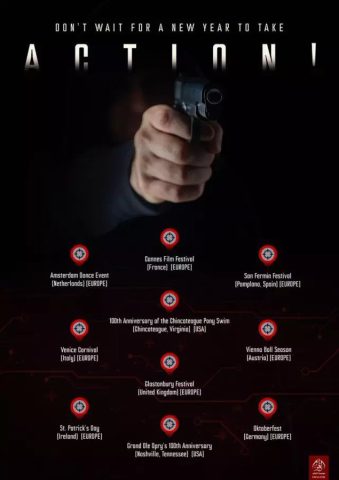NOTE: This article has been updated with new information from Europol since its original publication.
St. Patrick’s Day events in Ireland have been listed among 10 potential targets for attack this year by Islamist terror sympathisers linked to ISIS, with Europol saying they are monitoring the situation.
The EU’s official law enforcement agency told Gript they are aware of recently circulated “terrorist propaganda material” which features jihadist threats towards Ireland specifically.
IS-K, or Islamic State Khorasan, is the regional affiliate of ISIS operating in Afghanistan, Pakistan, and Central Asia. It follows ISIS’s ideology, aiming to establish a global Islamic caliphate. The group has been responsible for mass-casualty attacks within the last year, including in March 2024, when they attacked a concert hall near Moscow, killing 145 people and injuring over 550. It was the deadliest terror attack in Russia since 2004.
According to German newspaper Bild, a terror threat against Ireland was posted earlier this month to Al-Azaim Media, the unofficial media arm of IS-K. This was also independently reported by the Terrorism Research & Analysis Consortium (TRAC), which specialises in terrorism research.
A graphic shared on the terrorist platform shows a gunman’s hand holding a pistol and reads “Don’t wait for a new year to take action!” Below this it lists 10 events as potential targets for attack across Europe and America, mainly focusing on cultural events.
These include the St. Patrick’s Day Parade in Ireland, Glastonbury Music Festival in the UK, the Cannes Film Festival in France, Oktoberfest events in Germany, and more.
Bild reports that German State security sources are taking the threat seriously, particularly in light of recent Islamist incidents within the country.
Responding to a query about the graphic, a Europol spokesperson told Gript that “the post you are referring to relates to terrorist propaganda material disseminated by IS supporters since the beginning of the month.”
“Europol’s Internet Referral Unit identifies such content, analyses the background elements and shares relevant information with concerned EU Member States,” the spokesperson continued.
The agency added that according to the Europol Terrorism Situation and Trend Report 2024, the Internet and social media “remains pivotal for the dissemination of jihadist terrorist propaganda, aimed at radicalising and recruiting individuals to terrorism and violent extremism.”
“Radicalisation patterns show a shorter period of time compared to the past, between the point when these young individuals start consuming terrorist propaganda online and the point when they decide to participate in a violent attack,” the spokesperson said.
“Some of these suspects were connected and spent time on the same online channels and messaging groups where they may have been radicalised, as they could access propaganda, instructional material and other resources that could be used to plan and carry out an attack.
“Monitoring, referral and deletion of terrorist content online is crucial to combat radicalisation and terrorism activities offline.”
In August 2024, a mass stabbing in Solingen left three dead and eight injured, with ISIS claiming responsibility, and in December 2024, three suspects in Mannheim and Hesse were arrested on suspicion of plotting an ISIS attack, indicating an uptick in alleged Islamist terror activity.
Europol’s most recent EU Situation and Trend Report, released just last month, revealed that arrests for alleged jihadist terror offences in Europe surged last year, and doubled in Ireland.
Gript asked Gardaí if they were aware of the reported threat against Ireland and if they would release a statement on the matter. However, they simply replied “We don’t provide lines on unverified material posted online by third parties”, refusing to elaborate.
Notably, in 2018, Gardaí opted to establish an anti-terrorism operation in Dublin for the St. Patrick’s Day event, strategically shielding the parade route with large vehicles such as fire trucks to prevent terrorist attacks such as those seen in the city of Nice and London. At the time they said that this action was taken as a “precautionary” measure, but that there was no direct evidence of a threat, and “definitely no need for any concern”.
Infamously, in France in 2016, a 31-year-old Tunisian man drove a 19-tonne cargo truck into crowds during Bastille Day celebrations along a Nice promenade, resulting in 86 deaths and 434 injuries. The Islamic State claimed responsibility for that attack.
Meanwhile, in 2017 in England, three attackers drove a van into pedestrians on London Bridge, and then proceeded to stab people in nearby Borough Market. Eight people were killed, and 48 were injured.
One of the London Bridge attackers had lived in the Dublin suburb of Rathmines.
In August last year, a 16-year-old boy was arrested in Galway for allegedly stabbing and hospitalising an Irish Defence Forces chaplain, with Gardaí asserting that the accused had a “radical Islamist mindset”.
Europol told Gript that the mission of their Internet Referral Unit (IRU) is to “reduce public access to terrorist content online (TCO),” and warned social media users against sharing propaganda material without explicitly mentioning the context that it is terrorist in nature.
“Such sharing of online terrorist propaganda material without moderation further amplifies terrorist content online,” the agency said.
